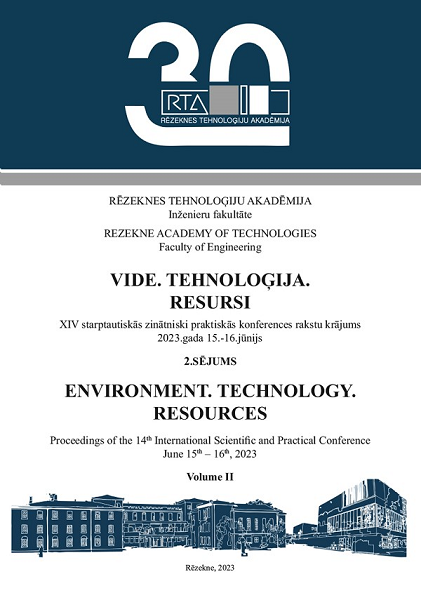DIGSM 4.0 CURRICULUM LIFECYCLE BASED ON COMPONENT ORGANISED LEARNING METHOD
DOI:
https://doi.org/10.17770/etr2023vol2.7311Keywords:
Component Organised Learning (COL), digitalization, Digital Supply Chain, Information and Communication Technologies (ICT), Higher Educational Institutions (HEI)Abstract
The research under consideration is how to build COL (Component Organised Learning) based curriculum lifecycle that teachers can apply in different fields. The problem is that the degree studies curriculum is not always applied to working students as the needs of the companies they work for differ. Companies find it more valuable when students can use the existing curriculum topics to solve today's company problems. Current degree studies take considerable time and are unsuitable for full-time employed specialists. The proposed Education 4.0 concept brings the knowledge and skills required by the market for full-time employed students in a time-efficient way. One possible solution to apply this concept in practice is to create a micro-credential curriculum for companies. The authors suggest using the intensive week approach for analysis, where the students will solve the real company problem using previously studied solutions. They will also use the Moodle courses linked to the developed COL to speed up access to the materials. Authors suggest organising such an event in collaboration with consortium partners and involving all teaching staff who worked on course development. After introducing problems brought by the company and visiting the company on site, asking the questions, students define the task to be solved in groups. After that, the Authors recommend providing intensive courses where each partner will present the developed Moodle materials. The target is that the students will solve the problem in 24h and present solutions to the company representative.
References
L. Murumaa, E. Shevtshenko, T. Karaulova. Component Organised Learning Method for Digital Supply Chain Hybrid Courses. ICL 2021. Lecture Notes in Networks and Systems, vol 389. Springer, First online in January 2022. https://doi.org/10.1007/978-3-030-93904-5_69
R. A. Rasheed, A. Kamsin, & N. A. Abdullah. Challenges in the online component of blended learning: A systematic review. Computers & Education, 144, 103701. First online in 2020. https://doi.org/10.1016/j.compedu.2019.103701
N. Syynimaa. Teaching on hybrid courses insights from commercial online ICT-training. CSEDU 2018 - Proceedings of the 10th International Conference on Computer Supported Education, Vol.1, 2018. https://doi.org/10.5220/0006701302530258
T. Boyle. Design principles for authoring dynamic, reusable learning objects. In Australian Journal of Educational Technology, Vol. 19, Issue 1, 2003.
P. R. Polsani. Use and Abuse of Reusable Learning Objects. J. Digit. Inf., 3. 2006.
L. Rowe. ACM Special Interest Group on Multimedia., Association for Computing Machinery. Special Interest Group on Data Communications., SIGGRAPH., & ACM Digital Library. 2004.
P. R. Polsani. Use and Abuse of Reusable Learning Objects. E-Education: Design and Evaluation, 3(4). 2003. https://journals.tdl.org/jodi/index.php/jodi/article/view/jodi-105
G. Onofrei, & P. Ferry. Reusable learning objects: a blended learning tool in teaching computer-aided design to engineering undergraduates. International Journal of Educational Management, 34(10), 2020. https://doi.org/10.1108/IJEM-12-2019-0418
M. Brown, M. Taylor, C. Hall, & S. Konstantinidis. Strengths, Weaknesses, Opportunities and Threats for Using Reusable Learning Objects in European Healthcare Curricula to Enhance Cultural Sensitivity. 2019. http://dx.doi.org/10.21125/inted.2019.2112
P. Fisk, http://www.thegeniusworks.com/2017/01/future-education-young-everyone-taught-together the future of learning will be dramatically different, in school and throughout life. 2017.
C. Pantazis. Maximising E-Learning to Train the 21 st Century Workforce Why E-learning? In Public Personnel Management, Vol. 31, Issue 1, 2002.
British council. (2014). Can higher education solve Africa's job crisis?" Understanding graduate employability in Sub-Saharan Africa. Going Global 2014.
Global Entrepreneurship Monitor. GEM Special Report: Africa's Young Entrepreneurs. 2015.
P. A. Igwe, U. C. Okolie, & C. V. Nwokoro. Towards a responsible entrepreneurship education and the future of the workforce. International Journal of Management Education, 19(1). 2021. https://doi.org/10.1016/j.ijme.2019.05.001
R. M. Ellahi, A. M. Khan & A. Shah. Redesigning curriculum in line with industry 4.0. Procedia Computer Science, 151, 2019. https://doi.org/10.1016/j.procs.2019.04.093
P. Gouëdard, B. Pont, S. Hyttinen, & P. Huang. Curriculum reform: A literature review to support effective implementation. 2020. https://doi.org/10.1787/efe8a48c-en
R. A. Rasheed, A. Kamsin, & N. A. Abdullah. Challenges in the online component of blended learning: A systematic review. Computers & Education, 144, 103701. 2020. https://doi.org/10.1016/j.compedu.
M. E. Porter. Clusters and the New Economics of Competition, 1998. https://hbr.org/1998/11/clusters-and-the-new-economics-of-competition
E. Shevtshenko, T. Karaulova, M. Igavens, G. Strods, I.Tandzegolskienė, V. Tūtlys, T. Seyed, and V. Kuts. Dissemination of Engineering Education at Schools and its Adjustment to Needs of Enterprises. In: Proceedings of the 28th DAAAM International Symposium, Zadar, Croatia, November 08–11, 2017 (Katalinic, B., ed.). DAAAM International, Vienna. 2017
E. Shevtshenko, T. Karaulova, M. Igavens, G. Strods, I. Tandzegolskienė, V. Tūtlys, and K. Mahmood. Innovative methods of engineering education popularisation at schools. Proc. Est. Acad. Sci., 68(4) (2019).



